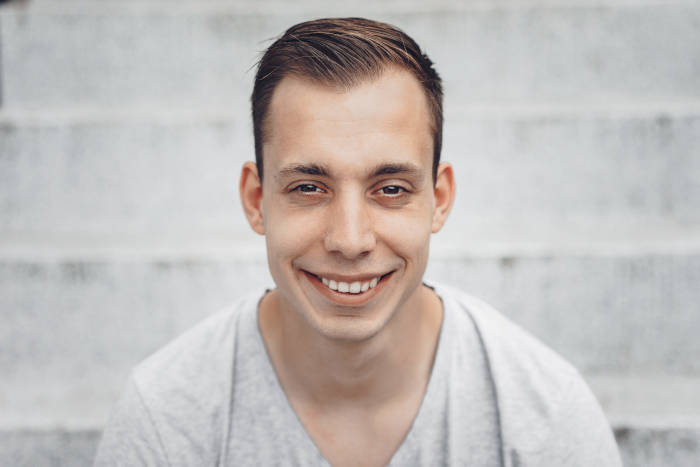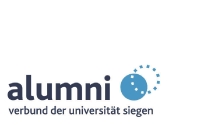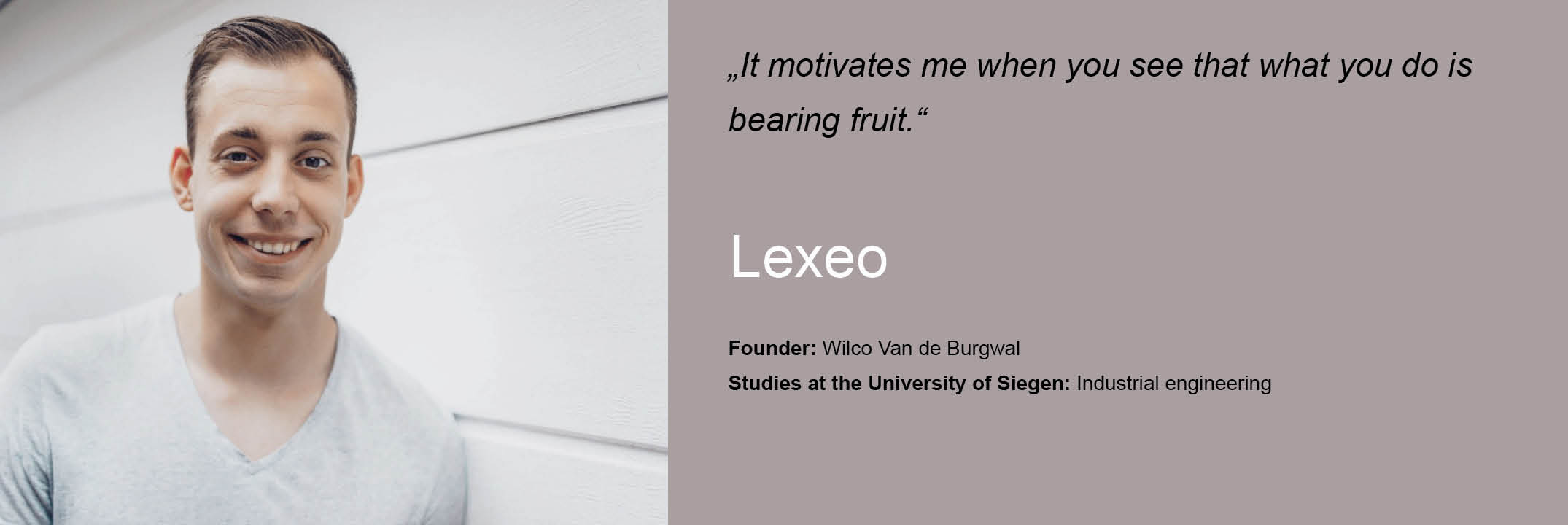Lexeo
Having just completed his Master's degree in Industrial Engineering and Management at the University of Siegen, the young founder Wilco Van de Burgwal knows exactly how teaching at the University of Siegen is structured and even more so how he would have preferred it to be. With Lexeo, he wants to help shape the transformation of university teaching. From crash courses for exam preparation and online courses to learning materials and flashcards, his offer summarises the learning content/scripts in a completely different and new way for students at the University of Siegen. Wilco's aim with Lexeo is not only to be a partner in the transfer of knowledge, but also a point of contact for students in all other university matters. How do I create a timetable? In this way, a compass can be created for students to help them structure their studies properly. ‘Lexeo should become THE contact point for students at the University of Siegen and help them realise their potential,’ says the founder. How and on which platform can I find the various documents? What do I do after my studies? ‘It's about reading the students‘ needs from their lips,’ is how Wilco himself describes Lexeo's work.
As the name suggests, Wilco comes from the Netherlands. He moved to Bergisch-Gladbach in Germany in the 2000s. After graduating from high school, Wilco came to Siegen to study, where he finally met his co-founder Alexander Tselnik. They founded their company in 2016, which Alex left in mid-2019. The start-up was financed from their own resources. In future, the range of courses will be expanded to include other subjects and degree programmes and will also be offered in English.

How did you come up with the idea of Lexeo and the associated idea of helping students at the University of Siegen to learn?
We kept our eyes peeled left and right. We thought about what we could do better where we were currently ‘living’ and that was our studies/university at the time. Alex and I had a joint study group, which gave us the idea in 2015 of preparing the learning content from the University of Siegen and making it available to other students. Two fellow students had already done exercises and offered crash courses via Facebook. We found this exciting and then offered to build a framework around it. We set up a homepage for them so that they could offer their crash courses more professionally and that's basically how the whole thing started.
What attracted you to setting up your own company?
I really enjoy realising things and creating benefits. It motivates me when I see that what I do bears fruit. For me, working in a company was never really an option. I always think ‘hey, what am I supposed to do after work?’ My fingertips are tingling, I have an incredible amount of ideas and am constantly thinking about where things could be changed.
When did you decide to set up your own company?
At some point, the third notepad was filled with thoughts and considerations about the start-up, so to speak, and the point was reached when it was time to put things into practice and get feedback from outside. But there was no day x that was decisive for the foundation.
What is/was innovative about your company?
Our approach is innovative in that we deal with new models, methods and approaches and break new ground in contrast to existing learning and teaching models. We try to create a free, homely and warm learning atmosphere with lots of interactive elements and practical examples and approaches such as gamification. We don't want to train students to memorise, but to focus on understanding. In addition, our learning programmes are specially tailored to the courses at the University of Siegen.
What was the biggest challenge you faced at Lexeo?
Challenges are more of a pleasure for me because I always learn something new. However, the collaboration with the University of Siegen turned out to be relatively arduous. It was very disappointing how little the university was open to new solutions and approaches.
To what extent did the university's start-up office support you?
There was a lot of support from the start-up office. The office space, the contact with the coaches and the events are definitely worth mentioning. The creative exchange and the spinning of further ideas with the other founders was and is also very helpful.
What is your advice for young founders?
Do it. Just go out and gather experience and feedback. It's not good to spend too much time just thinking about your own thoughts, because otherwise you're tripping yourself up for no reason. And last but not least, you should be honest with yourself and think about why you are really starting up. If you're only doing it for the money, then in my opinion you shouldn't set up a company, because then you'll lose your authenticity.
Would you found a company again?
Yes, definitely. At the moment, I'm also continuing to set up on the side. Together with a friend who is also setting up a start-up as part of the start-up office, we started producing masks during the coronavirus pandemic. My fingers are just tingling. I constantly see potential to change or improve things and am always looking for new projects. I think I've just always been the entrepreneurial type and as long as I enjoy it, I'll keep on founding.
This portrait is based on an interview with Wilco Van de Burgwal and was written by Janice Gust.
Click here for the startup's homepage.


